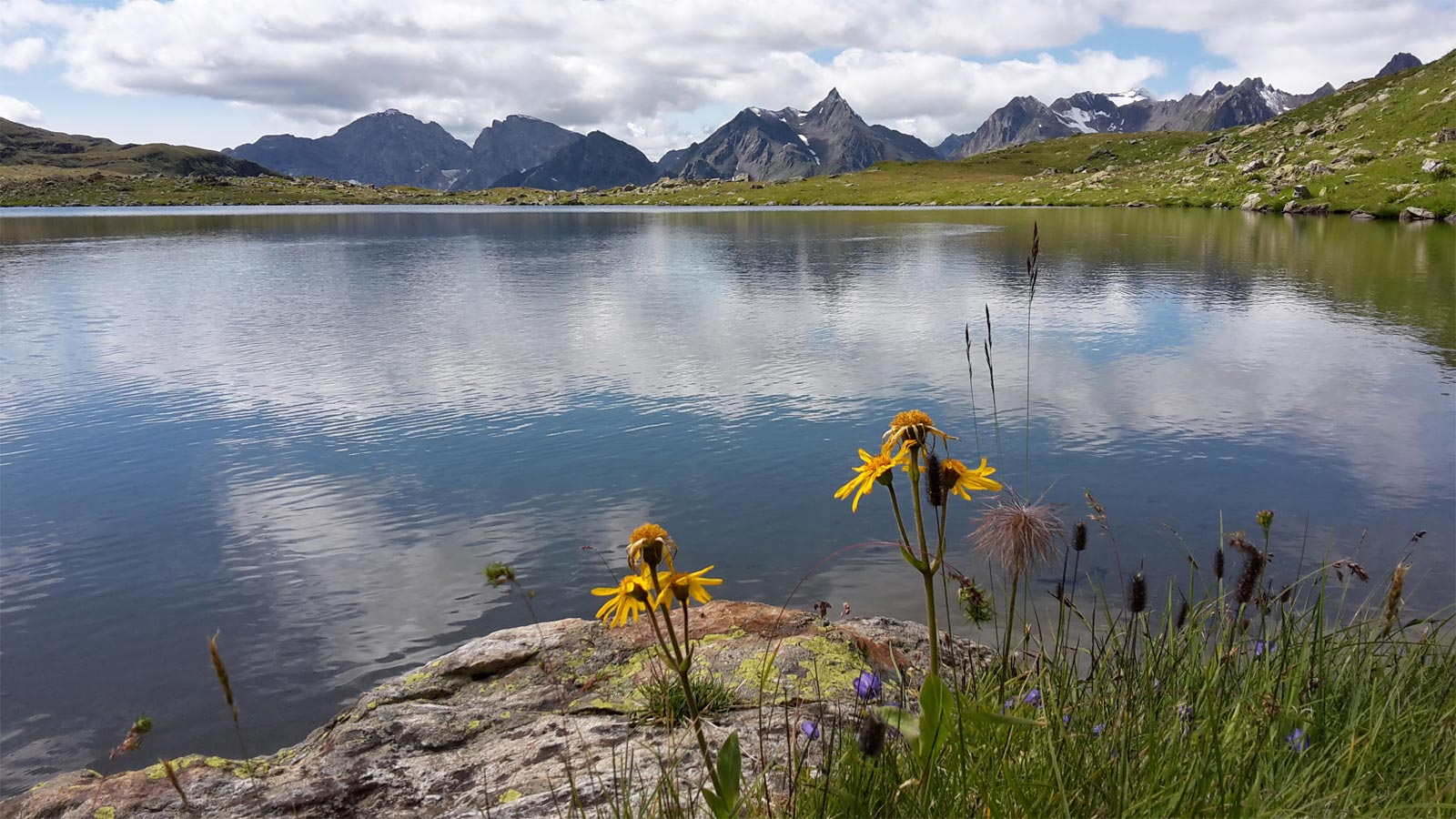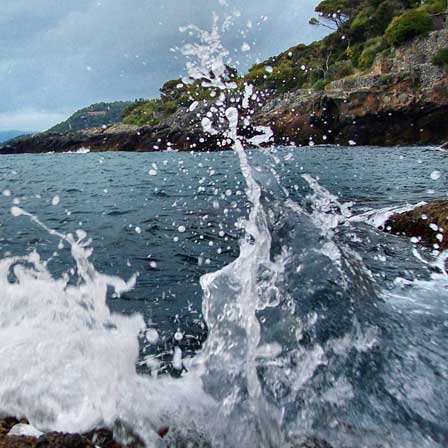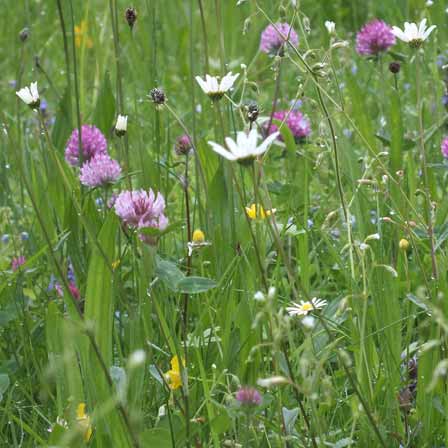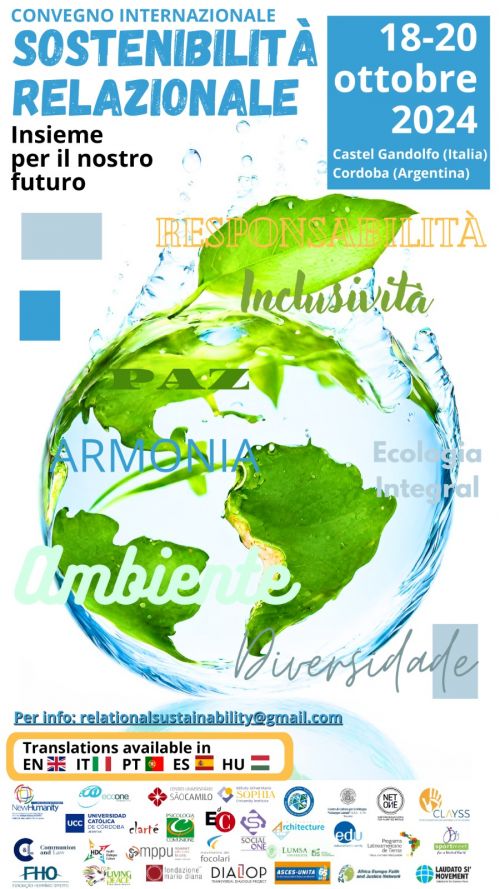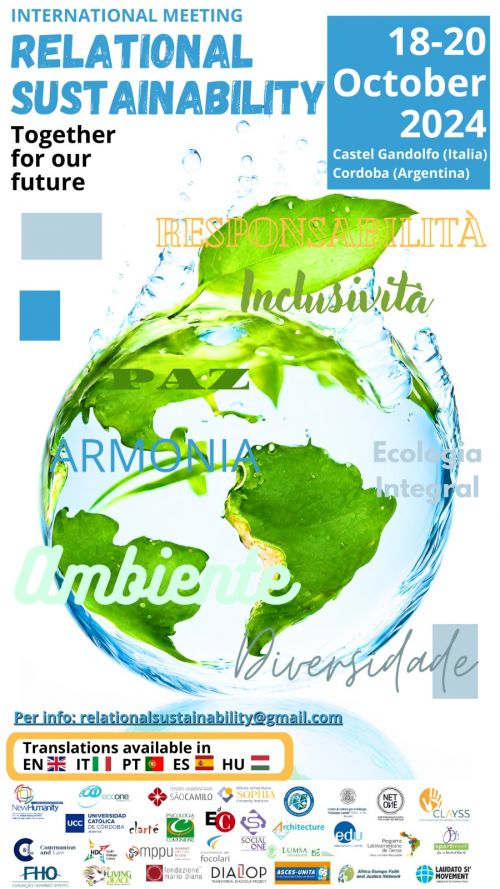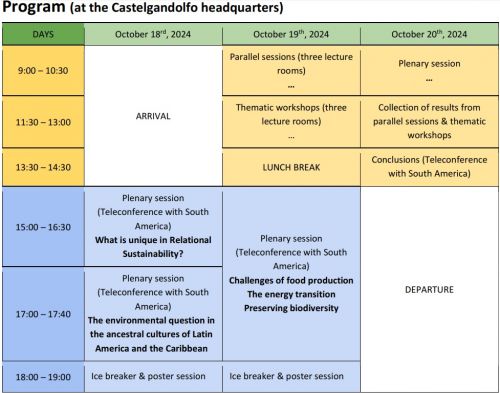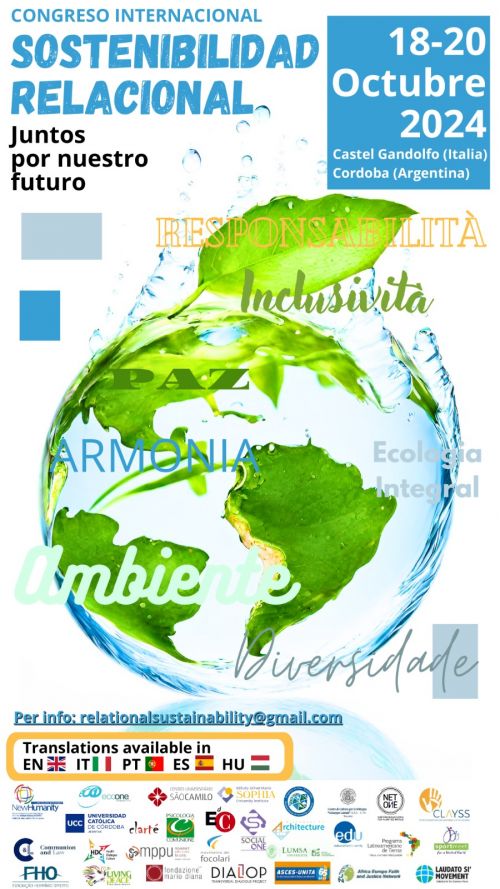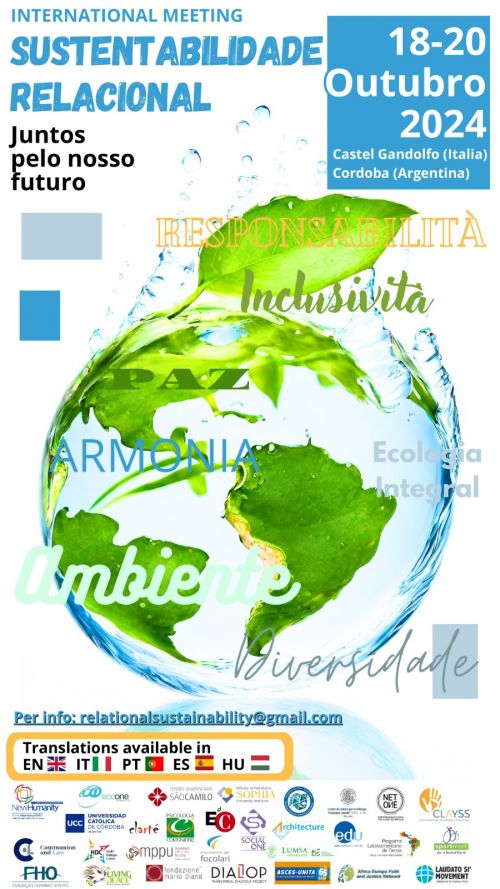Congresso Internazionale 2024
- Details
- Written by EcoOne
- Hits: 6895
SOSTENIBILITÀ RELAZIONALE
Il contributo delle scienze naturali e umane a una nuova sintesi delle dimensioni
personale, ambientale, sociale ed economica
Convegno Internazionale
18-20 ottobre 2024
Castel Gandolfo, Italia
Cordoba, Argentina
La sostenibilità relazionale rappresenta un concetto olistico che abbraccia le connessioni tra individui, tra
persone e natura e tra individui e società. È un invito a coltivare relazioni profonde, autentiche e durature in tutti
gli ambiti della nostra esistenza, ponendo le basi per un mondo più coeso, resiliente, giusto e sostenibile.
Dialogare con apertura, onestà e rispetto, creando uno spazio sicuro per la condivisione di idee, emozioni e
bisogni, sia all'interno delle relazioni interpersonali che nel dialogo tra uomo e natura. Comprendere i punti di
vista degli altri, mettersi nei loro panni e cercare di coglierne le emozioni, sia nei rapporti interpersonali che nel
rapporto con l'ambiente naturale. L’essere umano è parte integrante della natura, non un’entità separata da
essa. Questa relazione è fondamentale per il nostro benessere individuale e collettivo. La natura ci fornisce cibo,
riparo, medicine e ispirazione ed è una fonte di svago, contemplazione e connessione con qualcosa di più grande
di noi stessi. Le attività umane hanno avuto un impatto significativo sull’ambiente naturale, causando
inquinamento, deforestazione, perdita di biodiversità e cambiamenti climatici. Questi squilibri mettono a rischio
la nostra stessa esistenza e quella delle generazioni future. Per garantire la sostenibilità relazionale nella sua
accezione più ampia è necessario ripensare il nostro rapporto con la natura. Costruire un rapporto sostenibile
con la natura e tra gli individui è un impegno complesso che richiede la collaborazione di tutti. Governi, imprese,
organizzazioni non profit e singoli cittadini devono lavorare insieme per promuovere pratiche sostenibili,
proteggere il pianeta e coltivare relazioni autentiche e durature. Solo riconoscendo la nostra interconnessione
con l’ambiente naturale, adottando stili di vita più sostenibili e costruendo relazioni basate sul rispetto, la
compassione e la collaborazione possiamo garantire un futuro prospero alle persone, alla natura e alla società
nel suo insieme.
Il programma prevede interventi su invito, presentazioni selezionate (orali o poster), tavole rotonde, workshop
tematici e sessioni plenarie in dialogo con i relatori. I contributi richiesti riguardano i seguenti argomenti:
● Ecologia integrale
● Etica ambientale
● Sviluppo sostenibile
● Economia circolare
● Decrescita felice
● Teoria del ripristino dell'attenzione (ART)
● Salute e ambiente
● Ecosistemi e ricerche ambientali
● Sfide ambientali (riscaldamento globale, inquinamento da plastica, ecc.)
● Soluzioni tecnologiche (efficienza energetica, fonti rinnovabili, ecc.)
● Ecologia e Società (economia, politica, ruolo della comunicazione, dello sport, delle arti … e delle religioni
di fronte alla crisi ambientale)
● Architettura sostenibile e pianificazione urbana
● Educazione alla sostenibilità
● Eco-teologia
International Congress 2024
- Details
- Written by EcoOne
- Hits: 6261
RELATIONAL SUSTAINABILITY
The Contribution of Natural and Human Sciences to a New Synthesis of Personal, Environmental, Social, and Economic Dimensions
18-20 October 2024
Castel Gandolfo, Italy
Cordoba, Argentina
HOW TO PARTICIPATE
It is possible to participate in the meeting in three different ways:
1. IN PRESENCE: You need to register to the meeting by specifying this participation mode if you want to be
personally present to the meeting at the venue of Castel Gandolfo or at the Córdoba headquarters having the
opportunity to interact with the speakers all the time and also to show your activity to other participants.
2. ON LINE: You need to register to the meeting by specifying this participation mode if you want to follow the
meeting online by using your device (pc, notebook, tablet, or mobile). You will have the opportunity to interact
with the speakers during the sessions and to show your activity to other participants. After your registration, you
will receive a link to connect using the Zoom platform. This modality will be active to follow the planetary sessions
and the program developed at CastelGandolfo.
REGISTRATION (at the Castelgandolfo headquarters)*
To register for the congress, at the Castelgandolfo headquarters complete the Google form, specifying
the venue and mode of participation in the following form https://forms.gle/n3Lbdzs8vCBhSRtU9 (in English and Italian)
ABSTRACT PREPARATION, SUBMISSION AND ACCEPTANCE
The conference accepts abstracts written in English or Italian (CG) or Spanish or Portuguese (Córdoba),
with a maximum of 250 words. Abstracts must include a title, authors and corresponding affiliations,
and the e-mail of the author presenting the contribution. Always include the English translation of the
summary at the end, for later publication.
The abstracts to be submitted should be written under the proposal to better understand how
relational sustainability represents a holistic concept that encompasses the connections between
individuals, between people and nature and between individuals and society. The theoretical approach
should respond to how each of the different sciences can find a way to build the necessary relationships
to achieve sustainability by ensuring a prosperous future for people, nature and society as a whole.
Abstracts should be in a Word format template and sent to This email address is being protected from spambots. You need JavaScript enabled to view it., or
This email address is being protected from spambots. You need JavaScript enabled to view it. specifying whether you prefer an oral or poster presentation,
or if you have no preference, and in which of the two venues the work will be presented.
The template for the submission of abstracts will be available until 1 July.
The abstracts will be published as proceedings by the São Camilo University Centre Publications
Department. Authors who are interested can send their articles to the magazine indexed by Scopus "O
Mundo da Saúde" (https://revistamundodasaude.emnuvens.com.br/mundodasaude), in the
environmental health section. They will be reviewed by peers who will decide their final acceptance.
VENUE:
Europe: Centro Mariapoli, Via S. Giovanni Battista De La Salle, 00073 Castel Gandolfo RM, Italy
Latin America: Centro Mariápolis Alta Gracia, Ruta C 45 Km. 21, 5186 Alta Gracia, Córdoba, Argentina.
Tel +54 3547 580778; @centro_mariapolis_ag
Learn more on the New Humanity website: https://www.new-humanity.org/
Congresso Internacional 2024
- Details
- Written by EcoOne
- Hits: 8411
SUSTENTABILIDADE RELACIONAL
O contributo das ciências naturais e humanas para uma nova síntese das dimensões
pessoal, ambiental, social e econômica
18 a 20 de outubro de 2024
Castel Gandolfo, Itália
Córdoba, Argentina
A sustentabilidade relacional representa um conceito holístico que abrange as conexões entre os indivíduos,
entre as pessoas e a natureza, e entre os indivíduos e a sociedade. É um convite a cultivar relações profundas,
autênticas e duradouras em todas as áreas da nossa existência, lançando as bases para um mundo mais coeso,
resiliente, justo e sustentável. É um diálogo com abertura, honestidade e respeito, buscando criar um espaço
seguro para partilhar ideias, emoções e necessidades, tanto nas relações interpessoais como no diálogo entre o
homem e a natureza, para compreender os pontos de vista dos outros, para entrar em contacto com o seu lugar,
e tentar captar suas emoções, tanto nas relações interpessoais quanto na relação com o ambiente natural. Os
seres humanos são parte integrante da natureza e não uma entidade separada dela e essas relações são é
fundamentais para o nosso bem-estar individual e coletivo. A natureza nos fornece alimento, abrigo, remédios e
inspiração, e é fonte de recreação, contemplação e conexão com algo maior que nós mesmos. As atividades
humanas tiveram um impacto significativo no ambiente natural, causando poluição, desflorestação, perda de
biodiversidade e alterações climáticas. Estes desequilíbrios colocam em risco a nossa própria existência e a das
gerações futuras. Para garantir a sustentabilidade relacional no seu sentido mais amplo, é necessário repensar a
nossa relação com a natureza. Construir uma relação sustentável entre natureza e pessoas é um compromisso
complexo que requer a colaboração de todos. Os governos, as empresas, as organizações sem fins lucrativos e
os cidadãos individual e coletivamente devem trabalhar em conjunto para promover práticas sustentáveis,
proteger o planeta e cultivar relações autênticas e duradouras. Só reconhecendo a nossa interligação com o
ambiente natural, adotando estilos de vida mais sustentáveis e construindo relações baseadas no respeito, na
compaixão e na colaboração poderemos garantir um futuro próspero para as pessoas, a natureza e a sociedade
como um todo.
Nesta perspectiva, a programação do congresso incluirá conferências, mesas redondas, workshops temáticos,
sessões plenárias em diálogo com os palestrantes e apresentações selecionadas (orais ou pôsteres). As
contribuições podem ser nos seguintes tópicos:
● Ecologia Integral
● Ética ambiental
● Desenvolvimento sustentável
● Economia circular
● Decrescimento feliz
● Teoria da Restauração da Atenção (ART)
● Saúde e Meio Ambiente
● Ecossistemas e pesquisa ambiental
● Desafios ambientais (aquecimento global, poluição, etc.)
● Soluções Tecnológicas (eficiência energética, fontes renováveis, etc.)
● Ecologia e Sociedade (o papel da economia, da política, da comunicação, do desporto, das artes e das
religiões face à crise ambiental)
● Arquitetura sustentável e planejamento urbano
● Educação para a sustentabilidade
● Ecoteologia
Congreso Internacional 2024
- Details
- Written by EcoOne
- Hits: 7982
SOSTENIBILIDAD RELACIONAL
La contribución de las ciencias naturales y humanas a una nueva síntesis de las
dimensiones personal, ambiental, social y económica
18-20 Octubre 2024
Castel Gandolfo, Italia
Córdoba, Argentina
La sostenibilidad relacional representa un concepto holístico que abarca las conexiones entre los individuos,
entre las personas y la naturaleza y entre los individuos y la sociedad. Es una invitación a cultivar relaciones
profundas, auténticas y duraderas en todos los ámbitos de nuestra existencia, sentando las bases para un mundo
más cohesionado, resiliente, justo y sostenible. Un diálogo con apertura, honestidad y respeto, creando un
espacio seguro para compartir ideas, emociones y necesidades, tanto en las relaciones interpersonales como en
el diálogo entre el ser humano y la naturaleza, para comprender los puntos de vista de los demás, ponerse en su
lugar e intentar captar sus emociones, tanto en las relaciones interpersonales como en la relación con el entorno
natural. Los seres humanos son una parte integral de la naturaleza, no una entidad separada de ella. Esta relación
es fundamental para nuestro bienestar individual y colectivo. La naturaleza nos proporciona alimento, refugio,
medicina e inspiración, y es una fuente de recreación, contemplación y conexión con algo más grande que
nosotros mismos. Las actividades humanas han tenido un impacto significativo en el medio ambiente natural,
provocando contaminación, deforestación, pérdida de biodiversidad y cambio climático. Estos desequilibrios
ponen en riesgo nuestra propia existencia y la de las generaciones futuras. Para asegurar la sostenibilidad
relacional en su sentido más amplio, es necesario repensar nuestra relación con la naturaleza. Construir una
relación sostenible con la naturaleza y entre las personas es un compromiso complejo que requiere la
colaboración de cada uno. Los gobiernos, las empresas, las organizaciones sin fines de lucro y los ciudadanos
individuales deben trabajar juntos para promover prácticas sostenibles, proteger el planeta y cultivar relaciones
auténticas y duraderas. Sólo reconociendo nuestra interconexión con el entorno natural, adoptando estilos de
vida más sostenibles y construyendo relaciones basadas en el respeto, la compasión y la colaboración podremos
garantizar un futuro próspero para las personas, la naturaleza y la sociedad en su conjunto.
El programa incluirá conferencias, mesas redondas, talleres temáticos, sesiones plenarias en diálogo con los
ponentes y presentaciones poster seleccionadas. Las contribuciones pueden ser sobre los siguientes temas:
● Ecología Integral
● Ética medioambiental
● Desarrollo sostenible
● Economía circular
● Feliz decrecimiento
● Teoría de la restauración de la atención (ART)
● Salud y Medio Ambiente
● Ecosistemas e investigación ambiental
● Desafíos ambientales (calentamiento global, contaminación, etc.)
● Soluciones Tecnológicas (eficiencia energética, fuentes renovables, etc.)
● Ecología y Sociedad (el papel de la economía, la política, la comunicación, el deporte, las artes y las
religiones frente a la crisis ambiental)
● Arquitectura y urbanismo sostenibles
● Educación para la sostenibilidad
● Ecoteología
International Congress 2024
- Details
- Written by EcoOne
- Hits: 8255
RELATIONAL SUSTAINABILITY
The Contribution of Natural and Human Sciences to a New Synthesis of Personal,
Environmental, Social, and Economic Dimensions
18-20 October 2024
Castel Gandolfo, Italy
Cordoba, Argentina
Relational sustainability represents a holistic concept that embraces the connections between individuals,
between people and nature and between individuals and society. It is an invitation to cultivate deep, authentic
and lasting relationships in all areas of our existence, laying the foundations for a more cohesive, resilient, just
and sustainable world. Dialogue with openness, honesty and respect, creating a safe space for sharing ideas,
emotions and needs, both within interpersonal relationships and in the dialogue between man and nature.
Understanding the points of view of others, putting yourself in their shoes and trying to grasp their emotions,
both in interpersonal relationships and in the relationship with the natural environment. Human beings are an
integral part of nature, not an entity separate from it. This relationship is fundamental to our individual and
collective well-being. Nature provides us with food, shelter, medicine, and inspiration, and is a source of
recreation, contemplation, and connection with something greater than ourselves. Human activities have had a
significant impact on the natural environment, causing pollution, deforestation, biodiversity loss and climate
change. These imbalances put our very existence and that of future generations at risk. To ensure relational
sustainability in its broadest sense, it is necessary to rethink our relationship with nature. Building a sustainable
relationship with nature and between individuals is a complex commitment that requires everyone's
collaboration. Governments, businesses, nonprofits and individual citizens must work together to promote
sustainable practices, protect the planet and cultivate authentic, lasting relationships. Only by recognizing our
interconnection with the natural environment, adopting more sustainable lifestyles and building relationships
based on respect, compassion and collaboration can we ensure a prosperous future for people, nature and
society as a whole.
The program will include invited talks, selected presentations (either oral or poster), round tables, thematic
workshops and plenary sessions in dialogue with the speakers. The contributions solicited include the following
topics:
● Integral Ecology
● Environmental Ethics
● Sustainable Development
● Circular Economy
● Happy Degrowth
● Attention Restoration Theory (ART)
● Health and Environment
● Ecosystems and Environmental Research
● Environmental Challenges (global warming, plastic pollution, etc.)
● Technological Solutions (energy efficiency, renewable sources, etc.)
● Ecology and Society (economics, politics, communication, sport, arts and religions role facing the
environmental crisis)
● Sustainable architecture and urban planning
● Education for sustainability
● Ecotheology
©2020 EcoOne - Ecologically United
 This work is licensed under a Creative Commons License and it was made with Free Software released under the GNU/GPL License.
This work is licensed under a Creative Commons License and it was made with Free Software released under the GNU/GPL License.
Zenadia: grafica.co - at - focolare.org

